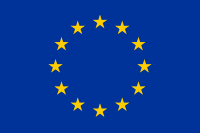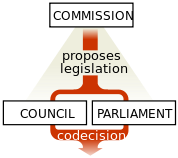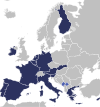Acquis communautaire
The acquis communautaire (English pronunciation: /ˈæki: kəmˈju:nətɛə/, French pronunciation: [aki kɔmynotɛr][1]), sometimes called the EU acquis, and often shortened to acquis,[1] is the accumulated legislation, legal acts, court decisions which constitute the body of European Union law. The term is French: acquis meaning "that which has been acquired", and communautaire meaning "of the community".
Chapters of the acquis
During the process of the enlargement of the European Union, the acquis was divided into 31 chapters for the purpose of negotiation between the EU and the candidate member states for the fifth enlargement (the ten that joined in 2004 plus Romania and Bulgaria which joined in 2007). These chapters were:
- Free movement of goods
- Free movement of persons
- Freedom to provide services
- Free movement of capital
- Company law
- Competition policy
- Agriculture
- Fisheries
- Transport policy
- Taxation
- Economic and Monetary Union
- Statistics
- Social policy and employment
- Energy
- Industrial policy
- Small and medium-sized enterprises
|
- Science and research
- Education and training
- Telecommunication and information technologies
- Culture and audio-visual policy
- Regional policy and coordination of structural instruments
- Environment
- Consumers and health protection
- Cooperation in the field of Justice and Home Affairs
- Customs union
- External relations
- Common Foreign and Security Policy (CFSP)
- Financial control
- Financial and budgetary provisions
- Institutions
- Others
|
For the negotiations with Croatia and Turkey, the acquis was split up into 35 chapters instead, with the purpose of better balancing between the chapters: dividing the most difficult ones into separate chapters for easier negotiation, uniting some easier chapters, moving some policies between chapters, as well as renaming a few of them in the process:
- Free movement of goods
- Freedom of movement for workers
- Right of establishment and freedom to provide services
- Free movement of capital
- Public procurement
- Company law
- Intellectual property law
- Competition policy
- Financial services
- Information society and media
- Agriculture and rural development
- Food safety, veterinary and phytosanitary policy
- Fisheries
- Transport policy
- Energy
- Taxation
- Economic and monetary policy
- Statistics
|
- Social policy and employment
(including anti-discrimination and equal opportunities for women and men)
- Enterprise and industrial policy
- Trans-European networks
- Regional policy and coordination of structural instruments
- Judiciary and fundamental rights
- Justice, freedom and security
- Science and research
- Education and culture
- Environment
- Consumer and health protection
- Customs union
- External relations
- Foreign, security and defence policy
- Financial control
- Financial and budgetary provisions
- Institutions
- Other issues
|
Correspondence between chapters of the 5th and the 6th Enlargement:
| 5th Enlargement |
6th Enlargement |
| 1. Free movement of goods |
1. Free movement of goods |
| 7. Intellectual property law |
| 2. Free movement of persons |
2. Freedom of movement for workers |
| 3. Right of establishment and freedom to provide services |
| 3. Freedom to provide services |
3. Right of establishment and freedom to provide services |
| 9. Financial services |
| 4. Free movement of capital |
4. Free movement of capital |
| 5. Company law |
6. Company law |
| 6. Competition policy |
8. Competition policy |
| 5. Public procurement |
| 7. Agriculture |
11. Agriculture and rural development |
| 12. Food safety, veterinary and phytosanitary policy |
| 8. Fisheries |
13. Fisheries |
| 9. Transport policy |
14. Transport policy |
| 21. Trans-European networks (one half of it) |
| 10. Taxation |
16. Taxation |
| 11. Economic and Monetary Union |
17. Economic and monetary policy |
| 12. Statistics |
18. Statistics |
| 13. Social policy and employment |
19. Social policy and employment
(including anti-discrimination and equal opportunities for women and men) |
| 14. Energy |
15. Energy |
| 21. Trans-European networks (one half of it) |
| 15. Industrial policy |
20. Enterprise and industrial policy |
| 16. Small and medium-sized enterprises |
| 17. Science and research |
25. Science and research |
| 18. Education and training |
26. Education and culture
10. Information society and media |
| 19. Telecommunication and information technologies |
| 20. Culture and audio-visual policy |
| 21. Regional policy and coordination of structural instruments |
22. Regional policy and coordination of structural instruments |
| 22. Environment |
27. Environment |
| 23. Consumer and health protection |
28. Consumer and health protection |
| 24. Cooperation in the field of Justice and Home Affairs |
23. Judiciary and fundamental rights |
| 24. Justice, freedom and security |
| 25. Customs union |
29. Customs union |
| 26. External relations |
30. External relations |
| 27. Common Foreign and Security Policy (CFSP) |
31. Foreign, security and defence policy |
| 28. Financial control |
32. Financial control |
| 29. Financial and budgetary provisions |
33. Financial and budgetary provisions |
| 30. Institutions |
34. Institutions |
| 31. Others |
35. Other issues |
Such negotiations usually involved agreeing transitional periods before new member states needed to implement the laws of the European Union fully and before they and their citizens acquired full rights under the acquis.
Other uses of the word acquis
The term acquis is also used to describe laws adopted under the Schengen Agreement, prior to its integration into the European Union legal order by the Treaty of Amsterdam, in which case one speaks of the Schengen acquis.
The term acquis has been borrowed by the World Trade Organization Appellate Body, in the case Japan - Taxes on Alcoholic Beverages, to refer to the accumulation of General Agreement on Tariffs and Trade (GATT) and WTO law ("acquis gattien"), though this usage is not well established.
It has been used to describe the achievements of the Council of Europe (an international organisation unconnected with the European Union):[2]
- The Council of Europe’s acquis in standard setting activities in the fields of democracy, the rule of law and fundamental human rights and freedoms should be considered as milestones towards the great European political project, and the European Court of Human Rights should be recognised as the pre-eminent judicial pillar of any future architecture.
It has also been applied to the body of "principles, norms and commitments" of the Organization for Security and Co-operation in Europe (OSCE):[3]
- Another question under debate has been how the Partners and others could implement the OSCE acquis, in other words its principles, norms and commitments on a voluntary basis.
The Organisation for Economic Cooperation and Development (OECD) introduced the concept of the OECD Acquis in its "Strategy for enlargement and outreach", May 2004.
References
External links
- EUR-Lex: European Union Law.
- JRC-Acquis, Aligned multilingual parallel corpus: 23,000 Acquis-related texts per language, available in 22 languages. Total size: 1 Billion words.
- Translation Memory of the EU-Acquis: Up to 1 Million translation units each, for 231 language pairs.
 Judiciary and law of the European Union Judiciary and law of the European Union  |
|
| Judiciary |
|
|
| Treaties |
|
|
| Instruments |
Acquis communautaire: Regulation - Directive (Framework Directive) - Decision - Recommendation
|
|
| Procedures |
Ordinary legislative procedure - Consultation procedure - Assent procedure - Commission and Council acting alone - Commission acting alone
|
|
| Principles and terms |
Subsidiarity - Supremacy - Direct applicability - Direct effect - Indirect effect - Incidental effect - Gold-plating - Four freedoms - Host state regulation - Home state regulation - Acquis communautaire (EUR-Lex) - Minimum harmonisation - Maximum harmonisation - Home country control - State liability - Proportionality - Principle of legal certainty - Principle of conferral - Preliminary ruling - European labour law- European Enforcement Order
|
|
| Regulations |
Council Regulation (EC) No. 1206/2001 - Council Regulation (EC) No. 1348/2000 - Customs Regulation 1383/2003 - Regulation 261/2004 - EU-Eco-regulation - Commission Regulation (EC) No 2257/94 - Customs Regulation 3295/94 - Regulation on roaming charges in the European Union - Brussels Regime - CLP Regulation - Regulation on Community designs - European Company Statute - European Union System for the Evaluation of Substances - Commission Regulation (EC) No 474/2006 - REACH - Rome II Regulation
|
|
| Directives |
Good Clinical Practice Directive - Data Protection Directive - ATEX directive - Battery Directive - Best available technology - Biocidal Products Directive - Birds Directive - Capital Requirements Directive - Clinical Trials Directive - Computer Programs Directive - Conditional Access Directive - Copyright Directive - Copyright Duration Directive (93/98/EEC) - Copyright Term Directive (2006/116/EC) - Cosmetics Directive - Dangerous Substances Directive (67/548/EEC) - Dangerous Preparations Directive - Data Retention Directive - Database Directive - Database right - Directive 2000/43/EC on Anti-discrimination - Directive establishing a general framework for equal treatment in employment and occupation - Directive on Privacy and Electronic Communications - Directive on the Promotion of the use of biofuels and other renewable fuels for transport - Directive on the re-use of public sector information - Directive on Electricity Production from Renewable Energy Sources - End of Life Vehicles Directive - CHP Directive - Directive on the energy performance of buildings - Directive on the enforcement of intellectual property rights - Directive 2004/38/EC on the right to move and reside freely - Environmental liability directive - European SEA Directive 2001/42/EC - European units of measurement directives - Habitats Directive - Integrated Pollution Prevention and Control - Internal Market in Electricity Directive - Landfill Directive - Directive on the legal protection of biotechnological inventions - Directive on the legal protection of designs - Markets in Financial Instruments Directive - Measuring Instruments Directive - Medical Devices Directive - Posted Workers Directive - Pressure Equipment Directive - Rental Directive - Resale Rights Directive - Restriction of Hazardous Substances Directive - Satellite and Cable Directive - Directive on services in the internal market - Temporary and Agency Work Directive - Trade Marks Directive - European Directive on Traditional Herbal Medicinal Products - Unfair Commercial Practices Directive - Universal Service Directive - Urban Waste Water Directive - Waste Electrical and Electronic Equipment Directive - Waste Incineration Directive - Waste framework directive - Water Framework Directive - Working Time Directive
|
|
| Cases |
ECJ Rulings (Caselex): Allonby v Accrington and Rossendale College - Apostolides v Orams - Bosman - Cassis de Dijon - Chacon Navas v Eurest Colectividades SA - Chen - Ciaran Tobin - Coleman v Attridge Law - Costa v ENEL - Factortame - Francovich - Kamer van Koophandel en Fabrieken voor Amsterdam v Inspire Art Ltd - Kolpak - Microsoft v Commission - Marleasing SA v La Comercial Internacional de Alimentacion SA - Metock - Nordsee - Palacios de la Villa v Cortefiel Servicios SA - Peter Paul and Others v Bundesrepublik Deutschland - Procureur du Roi v Dassonville - Ralf Sieckmann v Deutsches Patent und Markenamt - Tanja Kreil - Van Duyn v Home Office - Van Gend en Loos - Webster
|
|
| Fraud |
Court of Auditors - European Anti-fraud Office - Accountability in the European Union
|
|
|
European Union topics |
|
| History |
|
Timeline
|
Pre-1945 · 1945–1957 · 1958–1972 · 1973–1993 · 1993–2004 · since 2004
|
|
|
|
|
|
|
| Governance |
|
|
|
|
|
Agencies
|
Eurojust · Europol · Frontex · Environment · Reconstruction · Disease Prevention and Control
|
|
|
| Politics |
|
|
| Law |
Acquis · Competition law · Copyright law · Directive · Journal · Government procurement · Four freedoms (Labour mobility) · Procedure · Regulation · Schengen Agreement · Charter of Fundamental Rights · Treaties (Opt-outs) · Enhanced co-operation · Mechanism for Cooperation and Verification |
|
| Geography |
Borders · Extreme points · Largest municipalities · Largest urban areas · Largest metropolitan areas · Larger Urban Zones · Member States · Special territories · Regions |
|
| Economy |
|
|
| Culture |
Citizenship (Passports) · Demographics · Driving licence · Education · Institute of Innovation and Technology · Laissez-Passer · Languages · Religion · Sport · Holidays · Telephone numbers · Symbols · Statistics · Douzelage · Greater Europe
|
|
| Lists |
Agencies · Councils · Directives · Political parties · Presidency · NUTS regions · Tallest buildings · Vehicle registration plates · Acronyms, jargon and working practices
|
|
| Theory |
|
|
| Portal |
|






